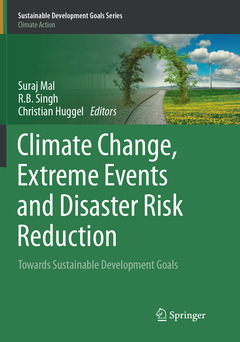Climate Change, Extreme Events and Disaster Risk Reduction, Softcover reprint of the original 1st ed. 2018 Towards Sustainable Development Goals Sustainable Development Goals Series

This book discusses the science, causes, impacts and risk reduction strategies for climate change and disasters. It focuses on the use of traditional knowledge, new innovation and education to build a culture of safety and resilience at all levels in order to promote sustainable development goals in general and disaster risk reduction in particular.
The global climate has changed substantially over the last century. There is strong evidence of global climate change in the form of increase in air and sea surface temperature, recession of glaciers, changes and shifting of climate regimes, increasing number of extreme events and sea levels changes. The increasing frequency of climate change induced disasters in particular is posing a threat to resilience, lives and livelihoods at global, regional and local levels. Major ecosystems of the world have experienced several climate induced disaster events in recent past.
This book provides new insights into the occurrence and impacts of climatic extremes and strategies for disaster risk reduction. It includes studies on rainfall and temperature trends, floods and drought disasters, weather and climatic related disasters in mountains, changes in plant activities, risk assessment and responses in different ecosystems of the world. The book is particularly useful for environmental and disaster managers, researchers and graduate students, as well as policy makers.
Introducing the Linkages between Climate Change, Extreme Events and Disaster Risk Reduction.- Analysis of weather- and climate-related disasters in mountain regions using different disaster databases.- Influence of climate change on environmental hazards and human well-being in the urban areas - Warsaw case study versus general problems.- Physiographic Influence on Rainfall Variability: A Case study of Upper Ganga Basin.- Water Deficit Estimation under Climate Change and Irrigation Conditions in the Fergana Valley, Central Asia.- Long-Term Trend of NDVI Response to Rainfall: A Geo-Spatial Approach.- Variability of Temperature and Rainfall in the Upper Beas Basin, Western Himalayas.- The Impact of Extreme Weather Events on Food Security.- Sedimentation Induced Depositional Lands of the Gumti River of Tripura and its Land Use Pattern.- Landscape Changes in the Activity of Higher Altitude Vascular Plants Species in the OB Plateau
(Altai Krai, Russia).- Application of Classification and Regression Trees for Spatial Prediction of Rainfall Induced Shallow Landslides in the Uttarakhand Area (India) Using GIS.- Is Climate Change the Nemesis of Rural Development?: An Analysis of Patterns and Trends of Zimbabwean Droughts?.- Entering the new +2°C Global Warming Age and a Threat of World Ocean Expansion for Sustainable Economic Development.- Climate change and coastal mega-cities: disaster risk assessment and responses in Shanghai City.- La Niña event 2010-2011: hydroclimatic effects and socioeconomic impacts in Colombia.- The Experience of Disaster Risk Reduction and Economic Losses Reduction in Malaysia during the Water Crisis 1998 in the Context of the Next El Niño Strongest on Record Maximum 2015.- Sustainable disaster risk reduction in mountain agriculture: Agroforestry experiences in Kaule, mid-hills of Nepal.- Building Community Resilience to Flash Floods: Lessons Learnt from a case study in the Valles Urban Area, SLP, Mexico.- Quantification of Geodiversity of Sikkim (India) and its Implications for Conservation and Disaster Risk Reduction Research.- Peak Discharge Analyses for Flood Management in Lower Gandak Basin.Date de parution : 09-2018
Ouvrage de 309 p.
17.8x25.4 cm
Date de parution : 12-2017
Ouvrage de 309 p.
17.8x25.4 cm


